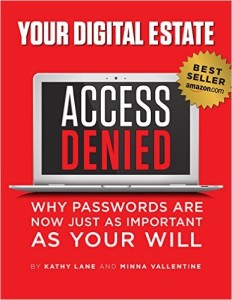 Much of our life lives online these days. Email is just the beginning. Do you have a Facebook account? What about PayPal? How about an online bank account?
Much of our life lives online these days. Email is just the beginning. Do you have a Facebook account? What about PayPal? How about an online bank account?
If you don’t include information about those digital assets in your estate plan, your family may have a terrible problem trying to access and deal with your online accounts. First of all, they will have to figure out what they are and then they will need to find a way to access them.
If your executor can’t track down your accounts, your estate may be at risk for fraud. For example, your Amazon account is probably hooked up to a credit card. If the account isn’t closed after your death, someone may hack it and make purchases which will have to be paid for by your estate.
Putting your digital assets in your estate plan is not a very simple matter. Each of the accounts you hold is governed by a terms of service agreement. You must have clicked on it when you opened the account. The agreement may limit access to the account to just you. To complicate things further, your family member will need your password for access. But it may be illegal for them to use that password. After your death, they will have to show that they have a right to access the account…but may still be unable legally to do so.
22 states have already enacted laws to help clarify how online accounts of the deceased can be accessed and managed. These laws are based on the revised Uniform Fiduciary Access to Digital Assets Act – UFADAA. And several more have introduced bills into their legislature.
There are some restrictions that are intended to protect the privacy of the deceased. For example, an executor can manage the digital property but may not be allowed to read the contents of email messages.
There are three parts to the revised UFADAA act:
1) If a service provider offers an online way for the user to state post-death wishes, the account owner’s use of that path determines what happens to the account. An example is Google’s Inactive Account Manager.
2) If there is no way provided after the account owner’s death or the account owner doesn’t use any tool available, the account owner’s directions in a will or other legal document will stand.
3) If the first two parts do not apply, the terms of service agreement that was clicked on when the account was open will determine how the digital assets are handled.
Other things you can do to be prepared are:
1) Create a list of your electronic accounts and include your log on IDs and passwords.
2) Use a password manager tool such as LastPass and share the information with your executor.
3) Think about putting all of your estate documents into an online vault like Dropbox or Everplans.
4) Put your digital asset plan into your estate documents. The more specific you can be, the better.
5) Think about writing a statement of intent in general that can apply to all of your accounts, even ones you may have forgotten about when writing your list in #1.
6) Decide and spell out clearly what information you want your executor to have access to. Do you want her to read all of your emails? You might want to limit what she can see.
7) Pick your executor carefully and make sure that person is at least somewhat tech savvy.
For more information about digital assets and estate planning, check out our website http://www.diesmart.com.


 lot of discussion about digital assets and what happens to your bitcoin accounts when you die.
lot of discussion about digital assets and what happens to your bitcoin accounts when you die.